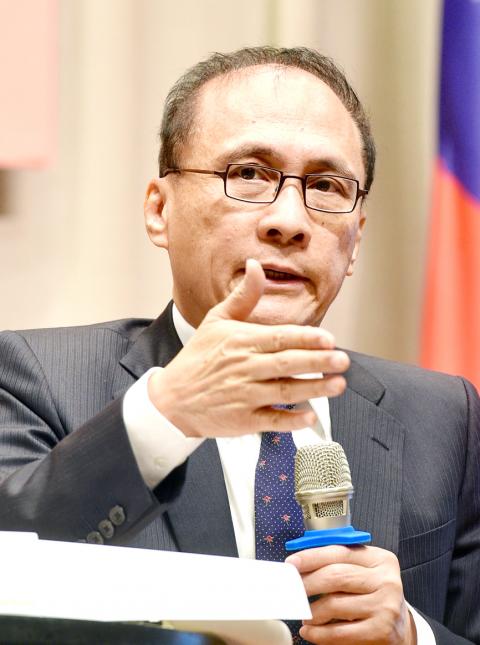The public and private sectors are to spend NT$200 billion (US$6.6 billion) on measures aimed at reducing air pollution, with a goal of lowering levels of PM2.5 — fine particulate matter with a diameter of 2.5 micrometers or less — by 18 percent by 2019.
The government said that NT$36.51 billion has been earmarked to target lowering PM2.5 levels from 22 micrometers per cubic meter to 18 micrometers per cubic meter by 2019 and to reduce the number of “air pollution red alerts” by 47 percent, or from 997 per year to 528 per year.
State-run Taiwan Power Co (Taipower, 台電) is to invest NT$10.11 billion to reduce power plant emissions by 2019 and another NT$22.15 billion afterward, while the private sector is expected to invest between NT$168.4 billion and NT$247.7 billion in air pollution controls.

Photo: Peter Lo, Taipei Times
The Cabinet has established 14 pollution control measures, including improving power generation efficiency; phasing out aging and energy-intensive vehicles and steam generators; reducing construction emissions, cooking emissions and dust emissions; curbing the burning of biomass and religious offerings; and promoting public transport and electric vehicles.
“The public does not feel the effects of the government’s pollution control measures, because there are too many sources of pollution and a single control measure cannot bring about much improvement,” Premier Lin Chuan (林全) said.
“The 14 short and medium-term measures — proposed by different ministries on a practical basis — are to engage air pollution in 14 battlegrounds to achieve tangible results in the short term,” Lin said.
As 10 to 40 percent of pollutants in Taiwan originate overseas, the government is to negotiate with neighboring nations to seek cooperation on regional pollution controls, Lin said.
Environmental Protection Administration (EPA) Minister Lee Ying-yuan (李應元) said the agency plans to phase out more than 1 million two-stroke scooters and 80,000 aging diesel trucks, while refitting 38,000 diesel trucks with diesel particulate filters in three years to reduce traffic emissions, which produce 30 to 37 percent of the total air pollution.
Stricter emissions controls would be implemented to reduce industrial emissions, which account for 27 to 31 percent of the total air pollution, with the EPA and the Ministry of Economic Affairs to subsidize the replacement of 6,000 inefficient steam boilers nationwide, Lee said.
Taipower has upgraded a coal-fired power plant in New Taipei City’s Linkou District (林口) with advanced ultra-supercritical power generation technology, which could lower the plant’s emissions to levels of natural-gas-powered plants, with Taipower planning to upgrade its power generation facilities nationwide, Lee said.
Asked if the requirements, coupled with plans to phase out nuclear power by 2025, would cause power shortages or investment instability, Lin said the government would ensure a stable supply of electricity and water to sustain economic development, adding that environmental protection is necessary even if it means more restrictions.

CHAOS: Iranians took to the streets playing celebratory music after reports of Khamenei’s death on Saturday, while mourners also gathered in Tehran yesterday Iranian Supreme Leader Ayatollah Ali Khamenei was killed in a major attack on Iran launched by Israel and the US, throwing the future of the Islamic republic into doubt and raising the risk of regional instability. Iranian state television and the state-run IRNA news agency announced the 86-year-old’s death early yesterday. US President Donald Trump said it gave Iranians their “greatest chance” to “take back” their country. The announcements came after a joint US and Israeli aerial bombardment that targeted Iranian military and governmental sites. Trump said the “heavy and pinpoint bombing” would continue through the week or as long

TRUST: The KMT said it respected the US’ timing and considerations, and hoped it would continue to honor its commitments to helping Taiwan bolster its defenses and deterrence US President Donald Trump is delaying a multibillion-dollar arms sale to Taiwan to ensure his visit to Beijing is successful, a New York Times report said. The weapons sales package has stalled in the US Department of State, the report said, citing US officials it did not identify. The White House has told agencies not to push forward ahead of Trump’s meeting with Chinese President Xi Jinping (習近平), it said. The two last month held a phone call to discuss trade and geopolitical flashpoints ahead of the summit. Xi raised the Taiwan issue and urged the US to handle arms sales to

State-run CPC Corp, Taiwan (CPC, 台灣中油) yesterday said that it had confirmed on Saturday night with its liquefied natural gas (LNG) and crude oil suppliers that shipments are proceeding as scheduled and that domestic supplies remain unaffected. The CPC yesterday announced the gasoline and diesel prices will rise by NT$0.2 and NT$0.4 per liter, respectively, starting Monday, citing Middle East tensions and blizzards in the eastern United States. CPC also iterated it has been reducing the proportion of crude oil imports from the Middle East and diversifying its supply sources in the past few years in response to geopolitical risks, expanding

Pro-democracy media tycoon Jimmy Lai’s (黎智英) fraud conviction and prison sentence were yesterday overturned by a Hong Kong court, in a surprise legal decision that comes soon after Lai was jailed for 20 years on a separate national security charge. Judges Jeremy Poon (潘兆初), Anthea Pang (彭寶琴) and Derek Pang (彭偉昌) said in the judgement that they allowed the appeal from Lai, and another defendant in the case, to proceed, as a lower court judge had “erred.” “The Court of Appeal gave them leave to appeal against their conviction, allowed their appeals, quashed the convictions and set aside the sentences,” the judges